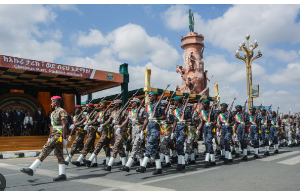Jasikan, May 9, GNA- The Chiefs, Elders and their subjects in the proposed Oti region (Northern Volta) on Monday expressed their indignation about media reports purporting Hohoe as its capital. They said such media reports were not only vexatious and fallacious in intent and content but also calculated to cause mischief, acrimony and likely to breach the peace.
Nana Yaw Osei Brantuo V, Adontehene of Buem Traditional Area at a press conference at Jasikan, bemoaning the assertion, stated that Hohoe could not be the capital of the Oti region, which would include Jasikan, Kadjebi, Nkwanta, Krachi East and Krachi West districts. Additionally, he said Hohoe was not part of the erstwhile Buem-Krachi District and Local Council Area during the pre-independence and post-independence eras and could therefore not be their capital today. The Adontehene said reports naming Hohoe as capital of the proposed Oti region, was beside the point, and, "to say the least provocative, fallacious and unmeritorious" with intent to deceive and confuse the reading and listening public.
Nana Osei Brantuo, also the Jasikanhene exclaimed that the media assertion was incorrect; "Hohoe was not part of the proposed Oti region, let alone, being offered a regional capital status on a silver-platter". He enumerated effective administration of the northern segment of the Volta region, the impracticable long distances to Ho, the current regional capital, the geographical barriers imposed by the high mountainous ranges and vast expanse of water bodies and poor road networks in the proposed area as ample justifications for the creation of the new region.
Others include the enormous potential for agriculture and industrial activity, neglect under previous regimes in the provision of adequate health infrastructure, Education and telecommunication facilities, all terminating at Hohoe, with the contemporary classical example being the Millennium Challenge Account programme.
Nana Osei Brantuo said these inadequacies had brought untold hardship, underdevelopment, poverty, ignorance, disease, and squalor onto the people.
He said the new region would give rise to a balanced infrastructural development with the cultural linguistic and traditional uniformity being retained.
In a reaction, Togbega Gabusu VII, Paramount Chief of Gbi Traditional Area said the decision to create a new region and its capital was a prerogative of President John A. Kufuor and his Council of Advisors with input from stakeholders.
He was optimistic that, that decision would not be based on ethnic or ethnocentric considerations, in order to satisfy the whims and caprices of a group of people.
Togbega Gabusu, also the President of the Volta Regional House of Chiefs suggested Northern Volta region for a name preferable to Oti region, typically, in the style of Upper West and East regions. He debunked the assertion that Eweland ended at Hohoe, stating that remnants of Guans still occupied places like Likpe, Tafi, Logba and Awatime, which are sited in the Hohoe district.
Togbega Gabusu recommended preferably Hohoe as the capital of the new Northern Volta region since there was adequate infrastructural base for a take-off affirming government's position of not creating districts or regions from a zero-point.
He commended government for engendering debate on the issue again but stated that the decision to create a second region was rife during the Supreme Military Council regime, headed by the late General Ignatius Kutu Acheampong, but lacked his assent until his overthrow. Togbega Gabusu advocated that the new region should start from Peki encompassing Kpando and Nkonya to Krachi with Hohoe as capital to atone for its denial, when the late Dr Kwame Nkrumah elevated Ho to a regional capital status as a punishment for supporting the UP tradition, which gave birth to the New patriotic Party.
He said the time to create a new region was now, since the northern part of the region had been marginalized and underdeveloped for far too long adding that it would facilitate easy administration and healthy rivalry as well as facilitating development. 9 May 07
Regional News of Wednesday, 9 May 2007
Source: GNA




![A file photo of the private jet [Image Credit: Yaw Pare via Facebook] A file photo of the private jet [Image Credit: Yaw Pare via Facebook]](https://cdn.ghanaweb.com/imagelib/pics/153/15348139.295.jpg)







